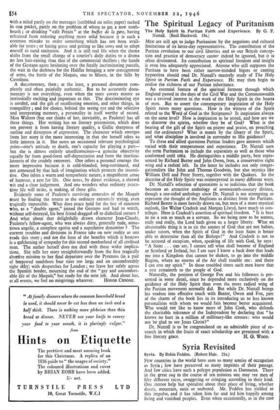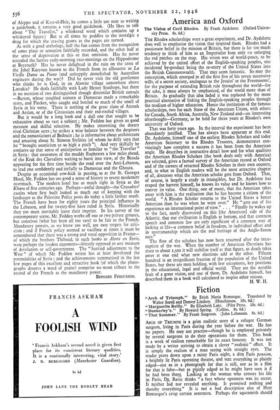Syria Revisited
Syria. By Robin Fedden. (Robert Hale. 21s.)
FEW countries in the world have seen so many armies of occupation as Syria ; few have preserved so many imprints of their passage. And few cities have such a polygot population as Damascus. There in the great suq in the course of ten minutes one may tee men of fifty different races, swaggering or cringing according to their kind. One cannot help but speculate about their place of living, whether desert, mountain, oasis or seaboard. Mr. Fedden has yielded to this impulse, and it has taken him far and led him happily among living and vanished peoples. Even when occasionally, as in the case
of Aleppo and of Kasr-el-Heir, he comes a little too near to writing a guidebook, it remains a very good guidebook. (He likes to talk about "The Traveller," a whiskered word which conjures up a whiskered figure.) But at all times he peddles to the nostalgic a drug for which the craving grows as the pages are turned.
As with a good anthology, half the fun comes from the recognition of some place or sensation faithfully recorded, and the other half at the sense of deprivation at this or that omission. Has he never attended the furtive early-morning race-meetings on the Hippodrome at Beyrouth? Has he never delighted in the ruin on the crest of the Jebel Kasyoun known to the French from its silhouette as La Vieille Dame au Piano (and unhappily demolished by Australian engineers during the war)? Did he never visit the old gentleman who thinks he is God, in an Alawite village somewhere above Lattakia? He deals faithfully with Lady Hester Stanhope, but there is no mention of two distinguished though dissimilar British consuls —Burton, whose troubled sojourn at Damascus made a remarkable story, and Flecker, who caught and bottled so much of the smell of Syria in his verse. There is nothing of the great clans of Attrash and Arslan, or of the Circassians and their red-roofed villages.
But it would be a long book and a dull one that sought to be exhaustive about so vast a subject ; Mr. Fedden has given us good measure and skilful selection. He makes interesting the dreary rival Christian sects ; he strikes a wise balance between the despisers and the romanticisers of Bedouin ; he is informative about architecture and amusing about St. Simeon Stylities (of whom he drily says that he " brought asceticism to so high a pitch "). And very skilfully he conjures up that sense of anticipation so familiar to " the Traveller " in Syria : that awareness of the muddy Euphrates a few miles ahead, of the Krak des Chevaliers waiting to burst into view, of the Barada appearing for the first time beside the road over the Anti-Lebanon, to lead one confidently and joyfully to Damascus and the Ghouta.
Despite an occasional cow-kick in passing, as at the St. Georges Hotel, Mr. Fedden has too good a sense of history to resent modernity overmuch. The modern hotel has as much right in Syria as the Khans of five centuries ago. Perhaps—awful thought—the Crusaders' castles when first built looked as much out of keeping with the landscape as the Palestine Police posts do today a little farther south. The French have been for eighty years the principal influence in the Lebanon, and for twenty-five have ruled in Syria. Historically they too must inevitably leave their imprint. In his survey of the contemporary scene, Mr. Fedden works off one or two private grouses, but contrives (what has been all too rare) to be fair to the French. Mandatory powers, as we know too well, are easy targets for criti- cism ; and if French policy seemed to vacillate at times it must be remembered that there was a strong and vocal opposition in France—
of which the brothers Thibaud, in such books as Alerte en Syrie, were perhaps the loudest exponents—bitterly opposed to any measure of devolution or self-government. The "hurried adjustment to the West " of which Mr. Fedden writes has at least developed the potentialities of Syria ; and the achievements summarised in the last few pages of this excellent and attractive book (of which the photo- graphs deserve a word of praise) comprise no mean tribute to the record of the French as the mandatory power.
BERNARD FERGUSSON.



































 Previous page
Previous page